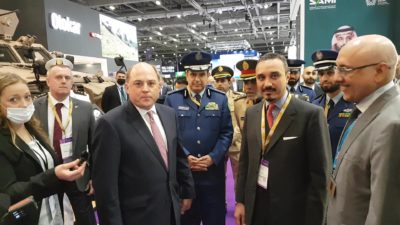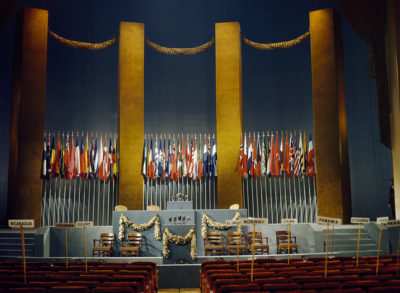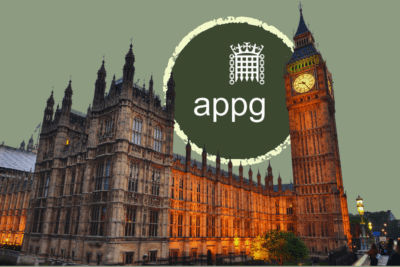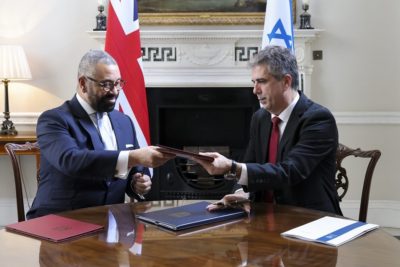Insights from the arms fair

DSEI 2021 shows that the UK military, the UK government and the arms trade are so deeply entangled that it is difficult at times to view them as separate entities. However, 2021 was an unusual year for the east London-based arms fair in that a few critical journalists managed to gain access. In effect, a blanket ban has operated for all but the most pliable reporters ye thankfully Matt Kennard and Phil Miller of Declassified UK and Iain Overton, of Byline Times and Action on Armed Violence, reported on what they saw inside the fair.
As Overton details in his report, there was an element of the surreal to an event that sanitised and commodified armed conflict. It is also a rare glimpse into those spaces where industry, politicians and armed forces representatives speak freely with eachother outside the gaze of public scrutiny:
‘I overheard a British arms supplier speaking to a British Army Colonel. “I want to spend my money fast,” said the officer. “I want to take your money fast,” said the supplier.’
Matt Kennard and Phil Miller were greeted into the arms fair by a retired British general who assured them: ‘We’ve got nothing to hide here. This is a legitimate government transactional business.’
The pair confronted defence secretary Ben Wallace on the alleged Saudi murder of journalist Jamal Khassoggi. Embarrassingly for Wallace, this came as he was playing tour guide for the Saudi ambassador and a gaggle of Saudi military officers. His response? That Saudi Arabia and the UK had been friends for a very long time.
General after General
Senior figures from every military service appeared at the fair as speakers, as well as various other lower ranking officers and civilian MOD officials.
General Patrick Sanders, head of Strategic Command, spoke about “multi-domain integration”. Chief of the General Staff Mark Carleton-Smith riffed on equipment. The Defence Secretary Ben Wallace and defence procurement minister Jeremy Quin also spoke. As did Second Sea Lord Vice-Admiral Nicholas Hine (on thinking outside the box) and Air Marshall Wigston. A full list of the military leaders who spoke at seminars and briefing across the event is available here.
Troublingly, he also appeared to re-affirm the UK commitment to “forever war” in his speech.
The language deployed was steeped in corporate and military jargon, mixed in with expressions of gratitude to defence firms like Clarion for getting the show back on the road post-Covid. Some speeches included personal recommendations for what stands to visit. Carleton-Smith, for instance, urged his audience to visit the British Army-sponsored land warfare ‘zone’.
Short-termism
In his speech Ben Wallace returned to many of the themes of the speech he recently gave to the American Enterprise Institute, including his bizarre remarks on making “decisions at the speed of relevance”. Troublingly, he also appeared to re-affirm the UK commitment to “forever war” in his speech. Telling his audience:
‘We’re rejecting the short-termism of the past. Creating instead a new framework to develop long term strategic plans. A framework which cuts our long-term costs, bolsters our ability to sustain prolonged conflict and reduces our reliance on others.’
Additionally, the idea of “reduced reliance on others” seemed at odds with real-world events during DSEI – primarily, the announcement that a new defence pact had been signed between the US, the UK and Australia. The AUKUS pact is highly focused on the Indo-Pacific – meaning, rivalry with China. The defence pact itself also raises questions about military equipment, having quickly given rise to a row about eight submarines which had been due to be built by France for Australia. These will now be built as part of a US/UK/Australian project in South Australia.
Wallace assured his audience that the Government will be making it easier to get an export license by unblocking the approval bottlenecks
We also got a further glimpse of what a post-Brexit “Global Britain” export policy will look like when Wallace assured his audience that the Government will be ‘making it easier for you to get an export license by unblocking the approval bottlenecks – often caused by a lack of resources or lack of expertise – that led to frustrating delays.’ The most recent delay on arms exports came from a High Court ruling that halted new weapons deliveries to Saudi Arabia because of potential breaches of international law in their ongoing bombing campaign in Yemen.
Integration
The DSEI website tells us that the event, ‘connects governments, national armed forces, industry thought leaders and the entire defence & security supply chain on a global scale.’
If deeper connection and integration between different branches of the security state, business, elected politicians and the press is DSEI’s aim, then it can count the 2021 event as a success.
Whether or not this deepening is by design, to fit into the vogueish notion of an integrated, society-encompassing approach in warfare and security, is unclear. But the presence, for once, of some critical journalists inside the fair provides insights that lend weight to the idea that both elected officials and the military are serving as salesmen for, and collaborators with, the UK and international arms industry.
As Iain Overton noted in his report, at the varied stands carrying drones, bombs and weapons were uniformed military personnel from across the world. Among these, a ‘British air-force pilot wearing a BAE Systems badge, like it was an extension of the state.’
See more: military in society, Fusion/integrated defence concept, arms trade
Like what you read?
> Sign up for our newsletter or blog notifications
> Support our work – from just £2 a month










